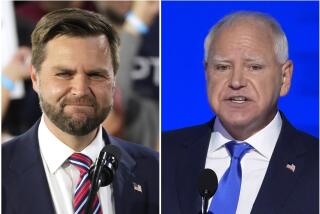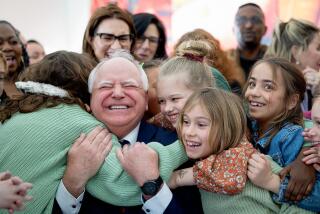ANALYSIS : Quayle’s Help to Ticket Questioned : Bush Choice Means He’ll Carry the Burden Alone
- Share via
NEW ORLEANS — When Democratic presidential nominee Michael S. Dukakis stepped up to select a running mate, he opted for a highly visible river boat gamble: He picked a Texas conservative whose beliefs clashed conspicuously with his own but whose strength in a huge state might bring pivotal help to the ticket.
Vice President George Bush on Tuesday opted for a different, but equally high-stakes, gamble: Trailing in the polls and still groping for a way to appeal to the nation’s voters, Bush elected to carry the burden virtually alone--without obvious help from a running mate.
His choice, conservative Sen. Dan Quayle of Indiana, virtually unknown on the national scene and relatively inexperienced in the Senate, appears to bring the Republican ticket neither a major electoral vote base nor clear appeal to swing voters.
“A solid second-termer who will not cause any major damage,” was the verdict of Rep. Newt Gingrich (R-Ga.), an outspoken conservative and a booster of New York Rep. Jack Kemp.
As a presidential understudy, however, Quayle is conspicuously inexperienced. And, unlike Democratic running mate Lloyd Bentsen, a political powerhouse in a key contested state, Quayle comes from one of the GOP’s safest states.
It is also unclear whether the Indiana senator can help firm up support for Bush in the important Midwest battlegrounds of Illinois, Michigan and Ohio. Equally untested is the assertion by some Republicans that, because of his youth, he will appeal to the baby boom generation.
Some Republicans say the handsome 41-year-old senator will help Bush close the “gender gap” that threatens his candidacy, citing Quayle’s record as a strong vote-getter among women in his Indiana races. Other analysts deride that notion, arguing that the gender gap is rooted primarily in the perception of many women that Reagan-Bush economic and social programs have been insensitive to their needs.
Actually, Bush’s choice suggests that he used his running mate decision chiefly to avoid offending conservatives, the backbone of his party. Many of them still view Bush with suspicion, but Quayle’s conservative credentials are unquestioned.
He has been among the Senate’s most vigorous defenders of President Reagan’s defense buildup, especially the Strategic Defense Initiative, or “Star Wars,” anti-missile defense system.
And, although he was involved in promoting a job-training plan with Sen. Edward M. Kennedy (D-Mass.), Quayle opposed to the bitter end the controversial plant closing notification bill that Reagan himself finally allowed to become law because of its symbolic importance to workers.
The AFL-CIO Committee on Political Education’s rating of Quayle’s voting record in the Senate is among the lowest in the body: 8 out of 100 in 1985, for example, and 10 in 1986. “From a labor standpoint, he would be chaos,” said Ernest Jones, the secretary-treasurer of the Indiana Federation of Labor.
Beyond his undisputed appeal to the GOP’s right wing, Quayle’s selection does not appear to offer the party substantial help in broadening its base.
And the need to broaden the Republican base is critical: If Bush is to follow in Reagan’s footsteps and gain the White House for a third successive Republican term, he must hold onto the votes of an estimated 10 million “Reagan Democrats.” They are moderately conservative middle-class and blue-collar Americans who nominally regard themselves as Democrats but voted for Reagan.
With his own up-scale background, Bush will have a hard time matching Reagan’s appeal to those voters. It is not clear how Quayle, also a scion of a rich and powerful family, might help him in this regard.
Among some swing voters, Quayle may help the ticket with his strong stand on the so-called “social issues”: opposition to abortion, support for school prayer and the like. But, as even conservatives point out, Reagan Democrats have plenty of other things on their minds, including the economic issues that attracted them to the Democratic Party in the first place.
Like Social Security
“A lot of these folks would like to torch the theaters which are playing the ‘The Last Temptation of Christ,’ ” said Patrick J. Buchanan, a key aide in the Richard M. Nixon and Reagan White Houses and a bulwark of the right wing. “But a lot them like the idea of having mom and pop in Florida living on Social Security.”
Some Republican strategists contend that Quayle might help bolster Bush in the Midwest, a Republican bastion in past elections but a critical battleground in this one. However, most analysts doubt that the fact that Quayle hails from Indiana will make much of an impression on the large and heterogenous electorates of Michigan, Illinois and Ohio. Those are the critical Midwest states; many believe that, along with California and Texas, they will be decisive in this election.
Another argument given for Quayle’s selection is that, because of his youth, he can mount a powerful appeal to the baby boom generation, generally considered to be the approximately 78 million Americans born between 1946 and 1964.
Generational Appeal
“I’m particularly struck by the generational appeal,” said Charles Black, who managed Kemp’s unsuccessful presidential bid and now is on Bush’s staff. “It’s a clear contrast with Lloyd Bentsen, and it should give us the opportunity to appeal to the baby boom voters.”
Similarly, Kenneth L. Khachigian, who wrote Reagan’s Monday night speech, said:
“There’s a lot of nice contrast with the other side. If I were Dukakis and one of the things I wanted to do was get back young Democrats who attached to (Reagan) coming out of college, the last thing I would have done was ask to be on my ticket a 67-year-old Texas Democrat who does not represent or symbolize the future of the Democratic Party.
“Now, we have a nice contrast, with Dukakis and Bentsen more of a geographic ticket and Bush and Quayle more of a generational ticket.”
But gathering in the baby boom vote has proved difficult for any politician to do because of the amorphous nature of this segment of the electorate.
‘New-Collar Voters’
“What most distinguishes the baby boomers from other political generations is how different they are from each other,” said Ralph Whitehead, a Democratic political consultant who specializes in studying the baby boomers and coined the term “new-collar voters” to describe some of them.
Whitehead said that a candidate’s ability to attract such voters might have little to do with age. He pointed out that the most successful candidate in appealing to baby boomers so far has been Reagan himself, now age 77, and that the strongest candidate among the 10 million World War II veterans was Dwight D. Eisenhower, many years the senior of most of the ex-GIs.
The caution that Bush exercised in selecting Quayle is striking in comparison with the boldness Dukakis demonstrated. In selecting Bentsen, Dukakis picked someone far different from himself and someone whose conservative views cut across the liberal grain of his own party.
Moreover, Texas, far from being a safe Democratic state, is Bush’s own back yard and, by selecting Bentsen, Dukakis chose to pick a critical fight with his opponent on his home ground.
Bentsen More Experienced
If vice presidents are supposed to offer strong credentials for taking over the Oval Office, as civics books say and most presidential candidates profess to believe, then Democrats argue that Quayle comes out on the short end when compared to Bentsen.
The Texan has served longer in Washington and has held more important positions--he is now chairman of the Senate Finance Committee. And he ran for the presidential nomination himself in 1976.
When asked about this comparison, conservative Gingrich said: “When was that ever a criterion?”
Anyhow, he added: “Quayle is just as qualified as John Kennedy was when he ran for President in 1960--and just as well respected in Washington.”
More to Read
Get the L.A. Times Politics newsletter
Deeply reported insights into legislation, politics and policy from Sacramento, Washington and beyond. In your inbox twice per week.
You may occasionally receive promotional content from the Los Angeles Times.










